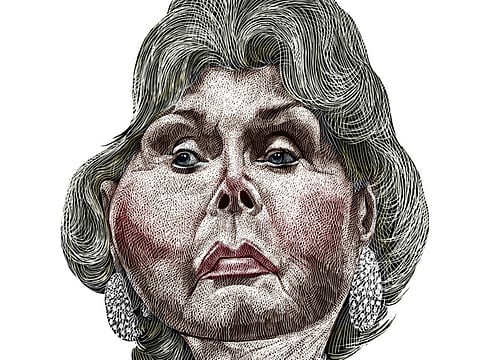Always the bride…
Zsa Zsa Gabor was an actress who turned the idea of being a celebrity into the business of being famous. And she had wit to go with her beauty

Until she died last week, I forgot that Zsa Zsa Gabor was alive. I had just assumed that she had passed away years ago. She hadn’t. Her sister, Eva, did, and I had mixed the two up.
She turned from being famous into being a celebrity. Long ago, before there was social media, Twitter, Snapchat, Instagram, Facebook or any other sort of self-promoting, ego-stroking, back-stabbing and self-flagellating apps, Zsa Zsa was the mistress of gossip, glitterati and guffaws. Her wit was as sharp as her beauty, her sense of promotion as coiffed as her tresses and her timing as fine as her dresses.
But what had she been?
A fetching Hungarian who immigrated to Hollywood, became a hot blonde, married a millionaire, made a couple of movies — and then stayed famous by looking and acting famous.
Sound familiar?
Yes, but she did it first and best, and that’s the “so what”: Zsa Zsa Gabor rouge’d a trail for the career-free celebrity. She was, simply, an invention of herself.
Without Zsa Zsa the road would’ve been rockier for women like Anita Ekberg, Twiggy, Ivana Trump, Anna Nicole Smith, Kim Kardashian, Paris Hilton (Zsa Zsa’s second husband’s great granddaughter), and most of the Real Housewives — as well as men, too, like the next president of the United States.
Without Zsa Zsa, who married nine times, the romantic reputations of more “respectable” celebrities would have borne greater strain. For professional socialites, she raised the bar by lowering it.
She worked hard at appearing not to work. She made classiness tacky, and tackiness classy, in a way that Donald Trump has done for 30 years. Zsa Zsa was the midpoint between Grace Kelly and Liberace.
What exactly did she do?
Well, she acted a little, got married a lot. Mostly she was a professional presence, the lively public performance of a fabulous self. She was a confectionary sort of person — sugar and cream spiked with something a little stronger, as soft as her name, as hard and bright as diamonds. She put the pop in the pop culture.
Born in Budapest in 1917, Gabor came to America from Hungary in 1941, more or less alongside her older sister, Magda; younger sister Eva, best-known now as the star of the 1960s sitcom Green Acres; and mother Jolie.
It will be said many times in the wake of her death last Sunday, two month’s short of her 100th birthday, that the Gabors were the Kardashians of their day, famous for being famous.
“They burst onto the society pages and into the gossip columns so suddenly,” friend Merv Griffin recalled, “and with such force, it was as if they’d been dropped out of the sky.”
The men in her life, even when as rich and famous as hotelier Conrad Hilton or actor George Sanders, seem like bit players; her multiple marriages — eight or nine by varying counts — may be seen as a search for love, but, as she more than once said, they were also a flight from boredom.
“Have any of your husbands had prostate problems?” Dame Edna Everage (Australian comedian Barry Humphries) had asked her in a 1987 interview. “I never give them enough time,” Zsa Zsa replied.
While her sister Eva was a focused actress, Gabor’s own film career was hodgepodge and eccentric, including small roles in big movies and big roles in small ones. In 1958, she had a brief part in Orson Welles’ Hollywood art-house classic Touch of Evil and starred in the sci-fi Amazon film Queen of Outer Space, in which, surprisingly, she does not play the Queen of Outer Space. Her first major role was for John Huston in 1952’s Moulin Rouge, but the parts were mostly minor after that.
Television was the medium that best conveyed her earthy, approachable glamour. She was a born guest, and a guest star, propulsively talkative, blithely self-revealing, casually aphoristic.
The bottle-blonde bombshells of her era were smarter than they let on — and Gabor could seem surprisingly proper, even chaste.
Former US president Richard Nixon had once set her up with Henry Kissinger, the former US secretary of state, she wrote in her memoir One Lifetime Is Not Enough, but clothes never came off. Imagine, though, the accented flirtation.
“Vut do you vunna do?”
“I dunno, dahling, vaatever you vaant.”
Said James Baker, former US secretary of treasury, to former president Ronald Reagan, after he was seated next to Zsa Zsa at a state dinner in 1982: “I owe you one.”
“There is no bigger aphrodisiac than power,” she said in 1987 to David Letterman, who introduced her as “one of the all-time great talk-show guests” and “the only woman I know named Zsa Zsa”. That was a perfect way to describe her. Zsa Zsa just was. And what she was fabulous.
“A man in love is incomplete until he has married. Then he’s finished,” she once noted in 1960, adding: “Husbands are like fires — they go out when unattended.”
Sadly, now, her fire has gone out.
— With inputs from agencies



